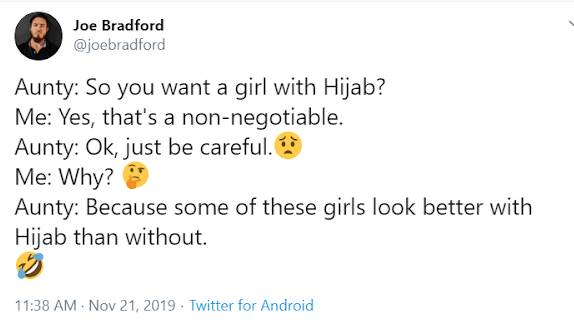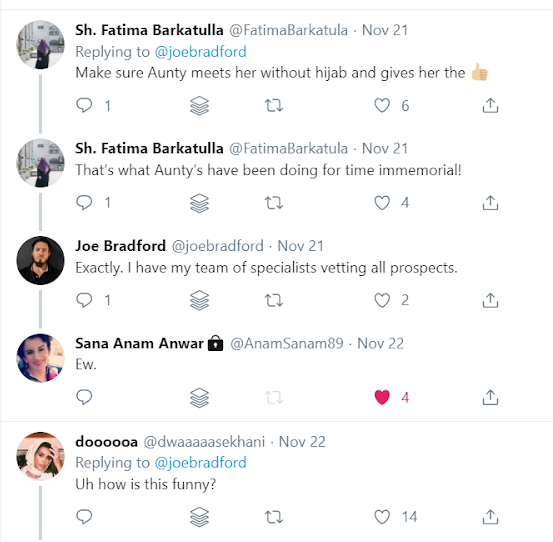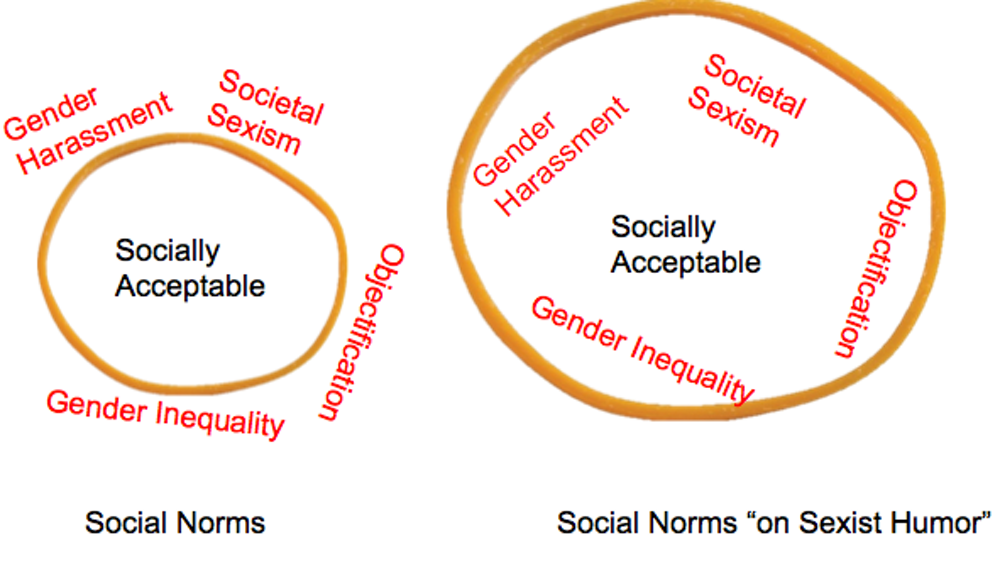Hijab. There is no doubt this symbol of a Muslim woman’s personal devotion to God is a controversial topic across the globe. Countries have mandated or required its removal, Islamophobes have verbally and physically attacked it, and now Muslim male scholars are objectifying women who wear it. Last week, Houston based Islamic Scholar Joe Bradford tweeted the following exchange:


Unsurprisingly, the tweet was met with a myriad of emotions from men and women in the community including shock, anger, disappointment, and pain. It was also defended, largely by Muslim men, as “just a joke.” According to them, outraged women were taking it too seriously and needed to calm down. After all, they argued, couldn’t women turn around and judge men for their beards, or lack thereof? But this was so much more than a slapstick joke about one’s physical appearance. The post, and Bradford’s subsequent non-apology that failed to address or remove it, was a leader’s endorsement of misogyny that has plagued our community for far too long.
Women who wear hijab and dress modestly in non-Muslim majority countries, like America, fight a battle every single day for agency over their own bodies in a society that hypersexualizes them. Hijab is not worn to look attractive or unattractive for men. It is worn for God alone. But the crass way in which Bradford laughs along with the aunty sexualizes and desecrates the hijab. At best, it reinforces the extreme shallowness that Muslim men feel entitled to when searching for a spouse. At worst, it ties into what domestic violence advocates and experts have emphasized for years: being vocally disparaging towards women raises red flags that a male partner may become abusive in a relationship. In other words, sexist “jokes” normalize and perpetuate a culture of misogyny and sexism, which can lead to all types of harassment, abuse, and oppression against women.
Sexist humor stretches our societal norms to allow vocabulary that would otherwise be considered unacceptable. Source: The Conversation.
We are aware that our aunties may not change, but we certainly expect better from our religious scholars, especially those who are in a position of influence over young Muslim men. Yet this behavior continues unchecked because those that do have the courage to speak up are dismissed as “feminists.” Supporters of these scholars either condone their problematic statement entirely because of their religious credentials, or condemn the behavior but label any criticism as an attempt to malign a figure who has contributed to our community. In short, they are comfortable with the status quo and see no reason to criticize a male religious leader because a few women got upset.
Sexist ‘jokes’ normalize and perpetuate a culture of misogyny and sexism, which can lead to all types of harassment, abuse, and oppression against women.
But it’s not just a few women. After we posted Bradford’s tweets to our social media channels, dozens of women came forward to express how much the “joke” had hurt them. Mothers of young children, hijabis, non-hijabis, single, married, and divorced women shared how angry and disrespected the tweets made them feel.
“I read this and started crying,” native Houstonian Mariam Sallam said. “Hijab has always been the hardest thing in my life. It is supposed to reveal what a person’s character is. I don’t need to be inspected, vetted, sexualized, etc. – especially from my own community. Muslim women need safe spaces. What’s even worse is that another woman [in the Twitter thread] participated in putting down other women.”
Even men stepped in to acknowledge how awful the post was.
“As a community leader, you need to hold the content you post to a higher standard,” Twitter user @CrymsonDawn said. “The moment you decided to tweet this, it stopped being a joke from an aunty and became and [sic] insulting endorsement from an Imam. I know you see sisters commenting about how this makes them feel.”
Men need to listen to women like Mariam, rather than dismissing them as too sensitive or unable to take a joke. They should recognize that they are in a position of privilege and largely unaffected by sexism and objectification in the ways that women are. They do not, therefore, have the authority to tell women how to think or feel about “jokes” that target them. The concerns that women raised are absolutely valid and come from real, lived experiences. Gaslighting these women doesn’t erase that fact.
Bradford should have sincerely apologized, taken the tweet down, and explained to his followers why it was problematic in the first place. This was an opportunity to educate the men and women that look up to him on a very real issue that is impacting the Muslim community. Instead, the burden has fallen on women, who bear the brunt of these “jokes,” to explain what went wrong.
Wardah Khalid is policy analyst and speaker on foreign affairs, immigration/refugees, and Islam in America. Huda Khalid is an engineer and survivor of domestic violence. Both are native Houstonians.


















I have no hope my comment will appease the OPs. But this was not a scholarly comment in capacity of an Alim. The guy was looking to get married after a difficult breakup and reported an actual conversation. Hope this will satisfy your need for appeasement. Or happy hunting.